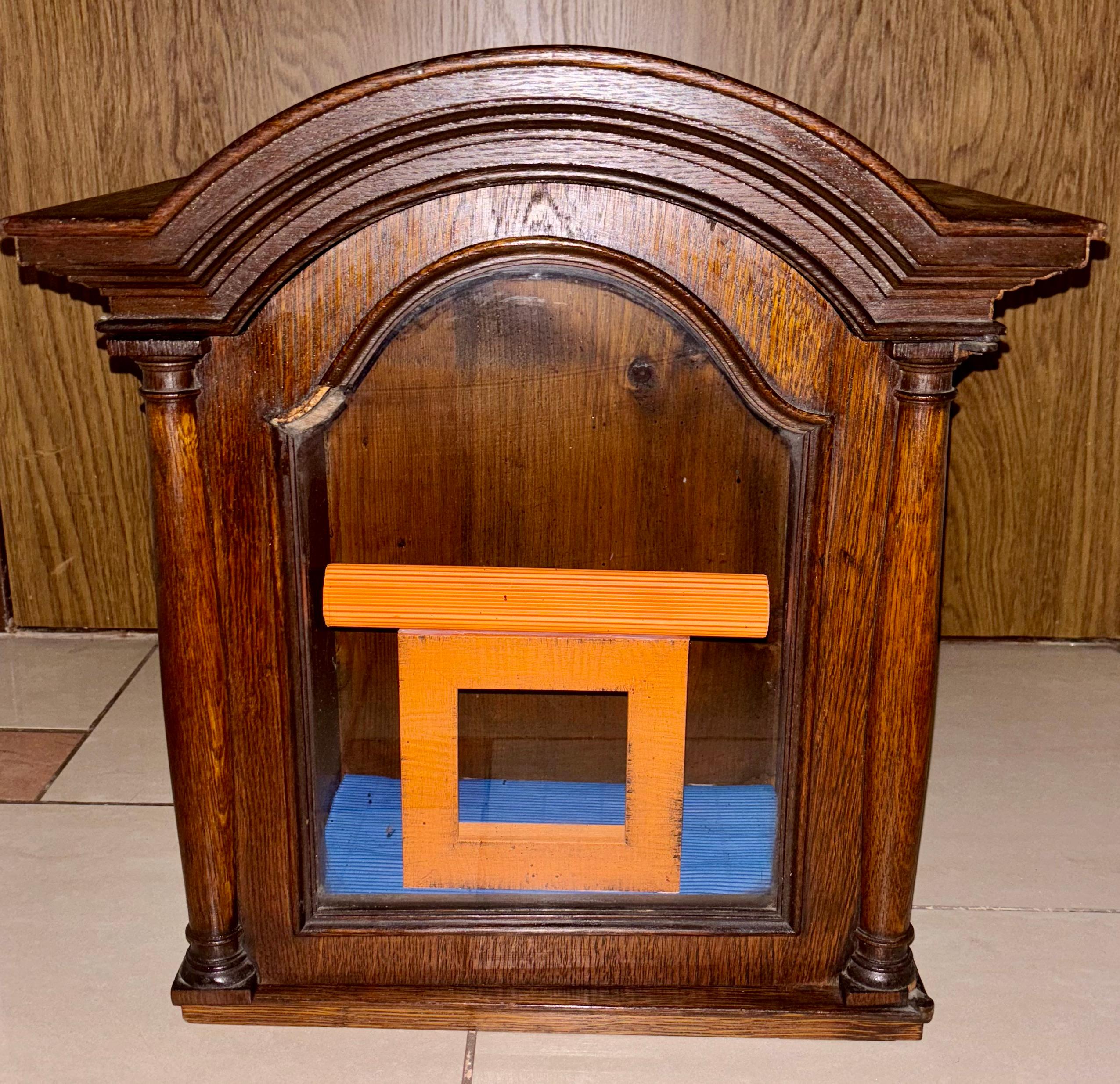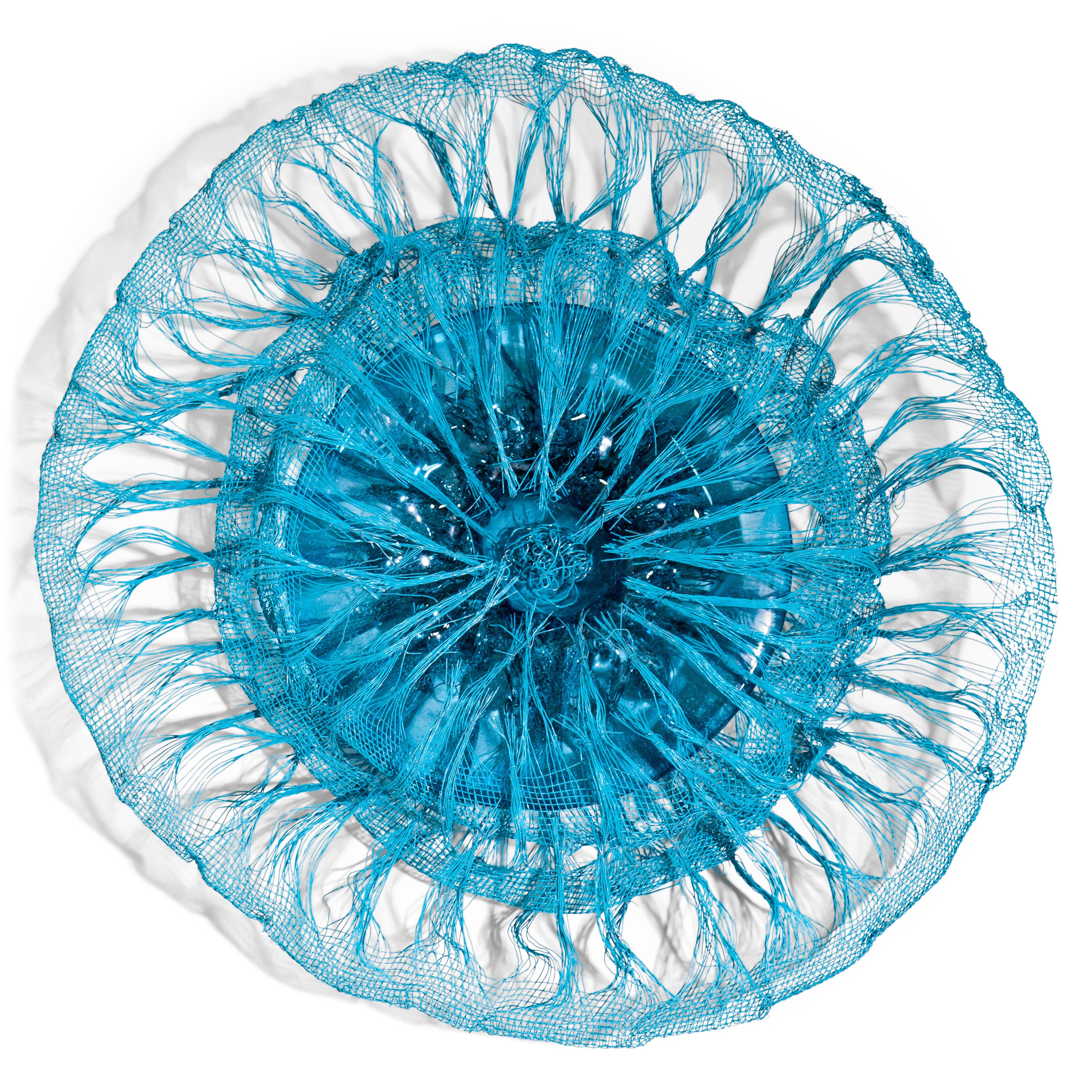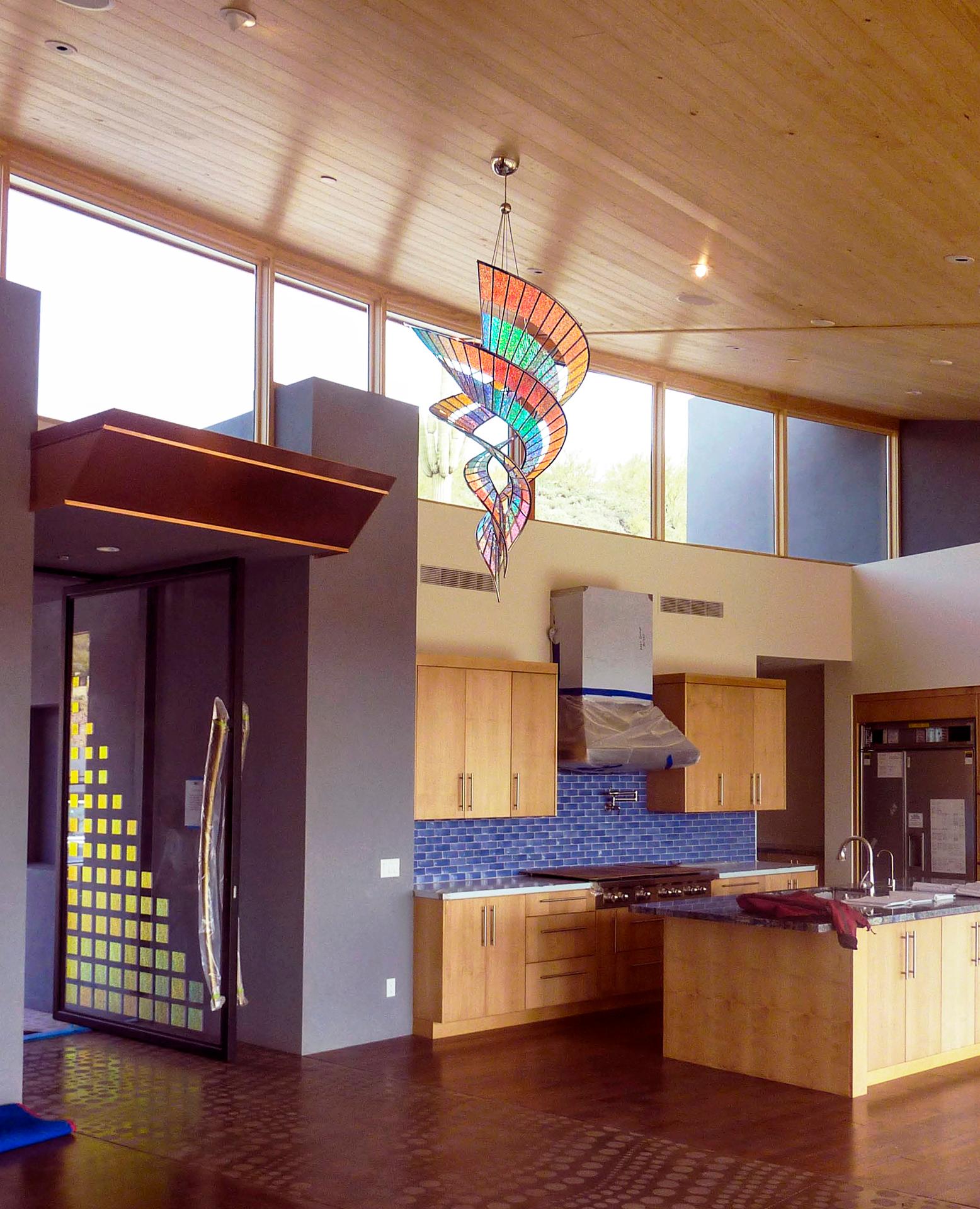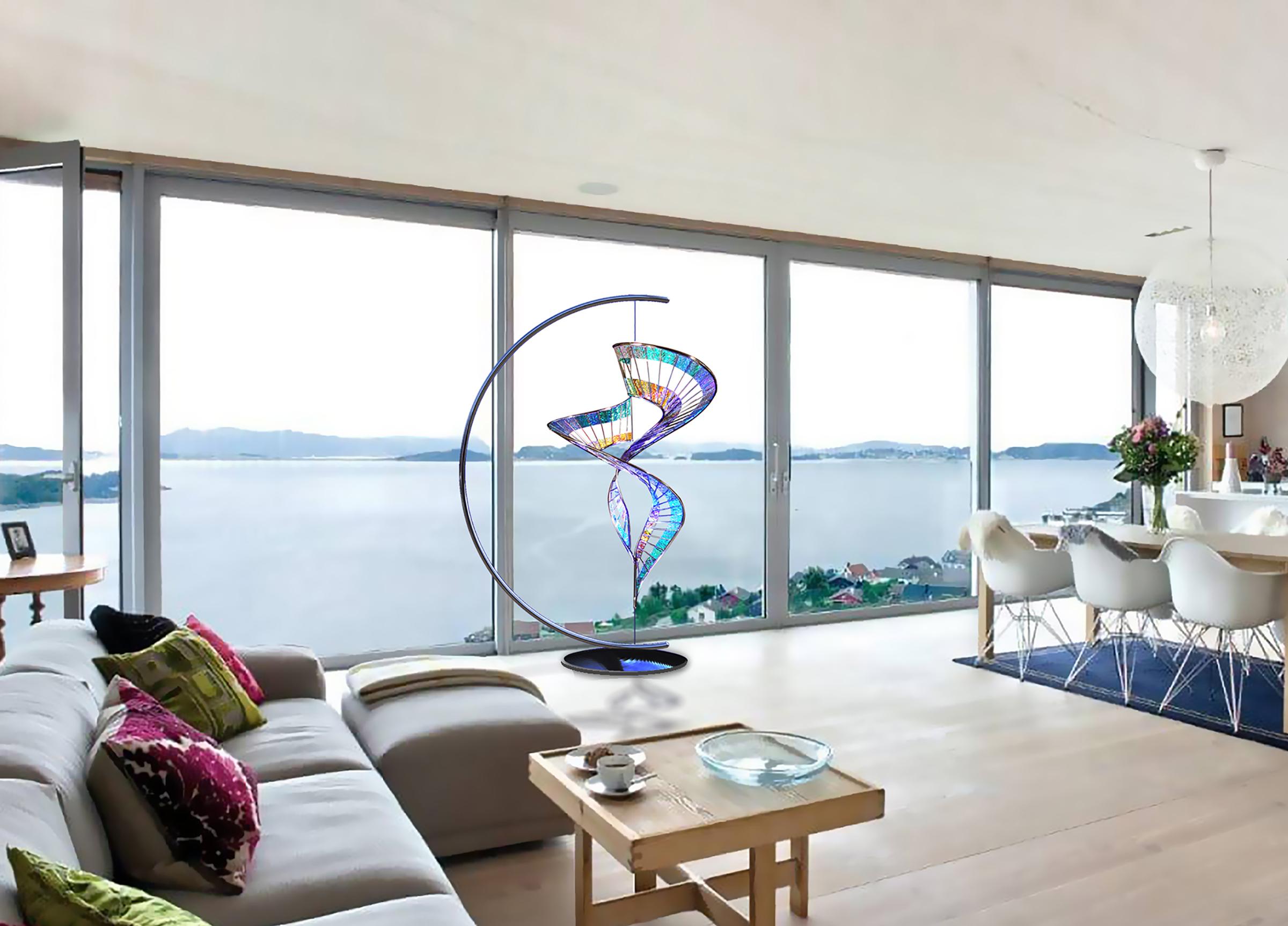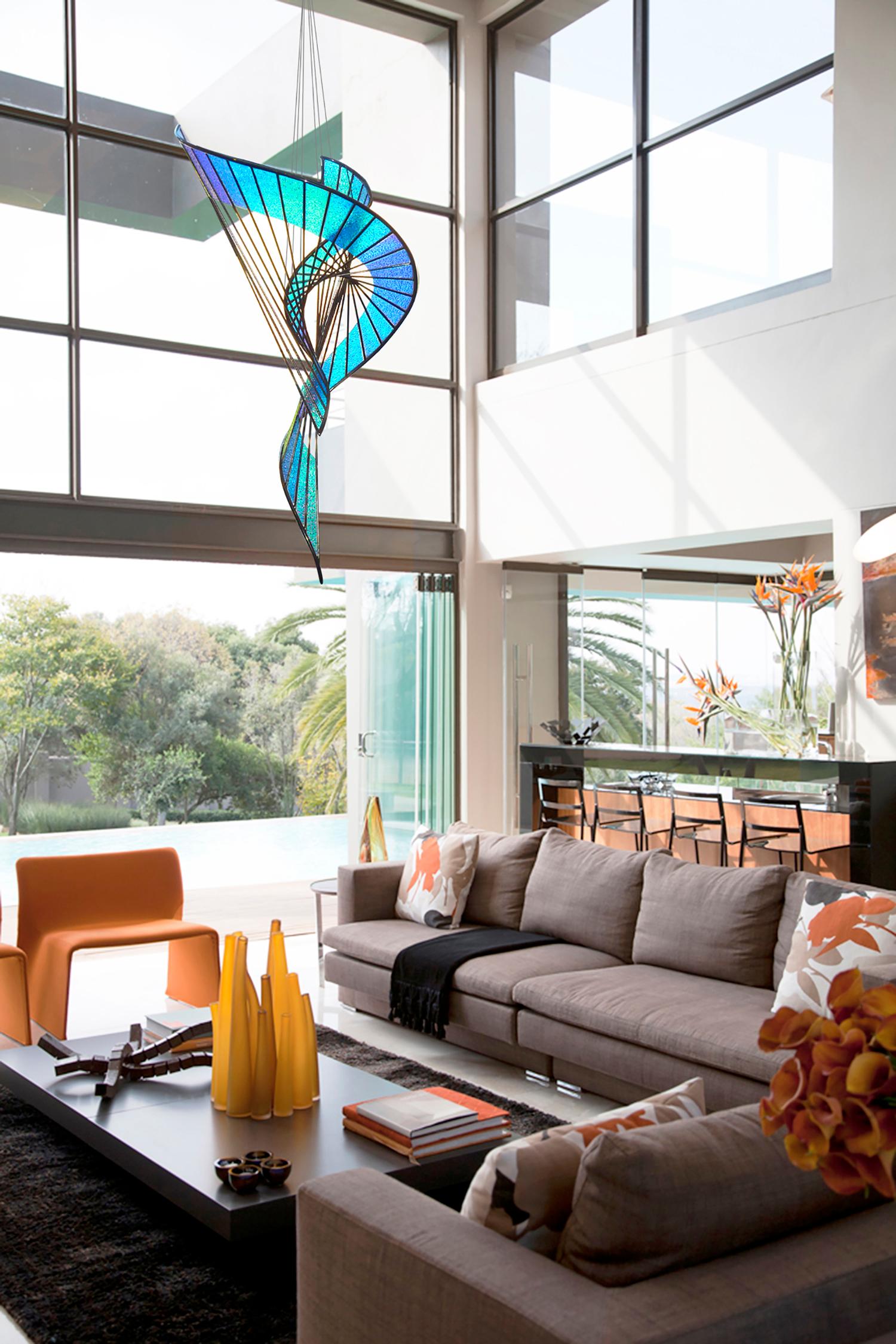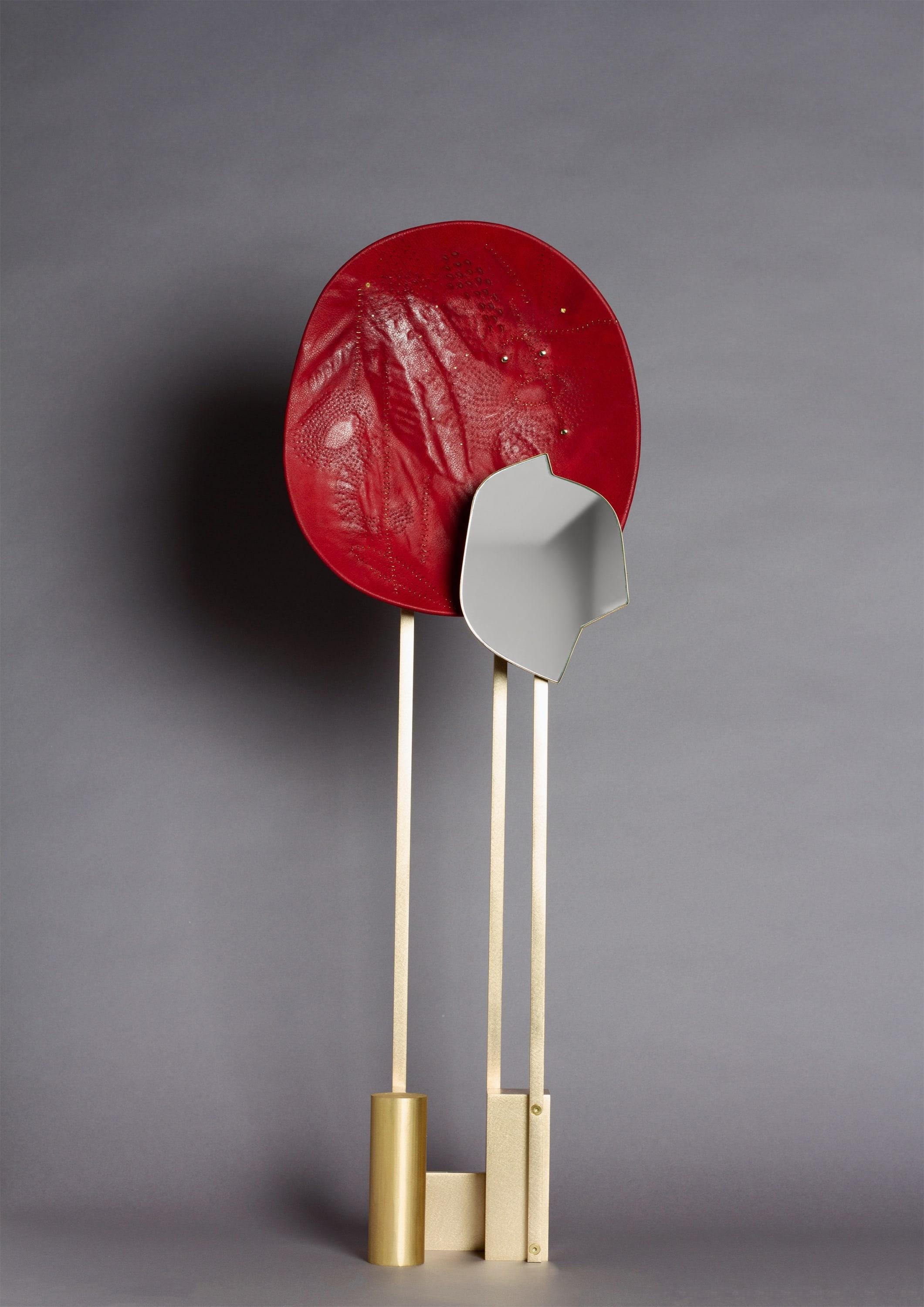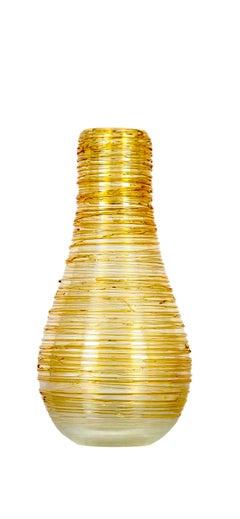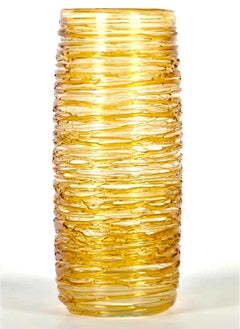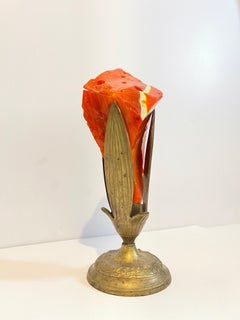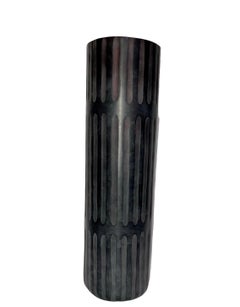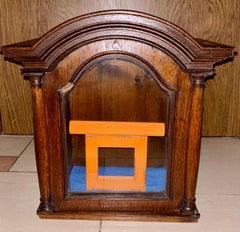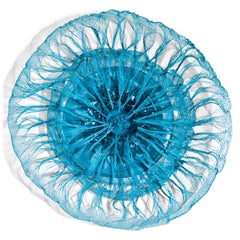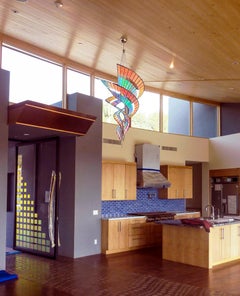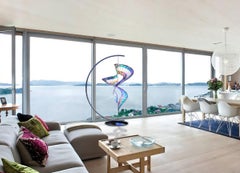Items Similar to Huge Seguso Murano Glass Centerpiece Sculpture
Want more images or videos?
Request additional images or videos from the seller
1 of 8
Livio SegusoHuge Seguso Murano Glass Centerpiece Sculpture
$2,800
£2,122.24
€2,456.70
CA$3,952.87
A$4,401.84
CHF 2,298.30
MX$53,336.43
NOK 28,984
SEK 27,348.68
DKK 18,338.98
About the Item
A huge centerpiece good-quality Seguso Murano (probably 1970s or 1980s, Memphis Milano era) elliptical-form clear glass sculptural bowl with striated rainbow colors of blue, orange, pink, red, yellow and green; the thick clear glass bowl with layers of embedded colors.
Designed by Livio Seguso, produced by Seguso A.V.
Murano glass modernist sculpture vase; clear ovoid body with vertical polychrome applied canework and a black fasce swatch. Label and engraved signature. "Arte Vetro" sculpture They also did work for Cartier- a number of fine mid century craftsmen and artists did work under the Seguso name amongst them Flavio Poli, Barovier Archimede Seguso, Livio Seguso and Mario Pinzoni. This is an incredible piece.
Livio Seguso
Born in 1930 in Murano, where he still works, Livio Seguso began his life-long affair with glass from a very early age, fascinated by the inexhaustible appeal of that wonderful medium. After having achieved an in-depth knowledge of the traditional glassmaking techniques, and stimulated by his strong artistic sensitivity, this artist turned to plastic forms, and his research led him to explore with avid interest the world of the of the great masters of contemporary sculpture. In those years, glass was not used as a medium of mere depiction, but it was in itself the very object of his artwork. Seguso's mastery of his medium was such that it allowed him to express himself completely without being hampered by the limits of craftsmanship. The artist fully revealed the infinite potentialities of this mysterious material in an endless variation of spaces and thicknesses, always aiming at an absolute purity of forms. Livio Seguso reached his full artistic maturity in the late 70's, when he totally abandoned the Murano Venice glassmaking heritage, however noble, and began to focus on clear crystal, changeable and ambiguous in its transparency, the perfect medium for the artist's uncontaminated imaginative vision. His sculptures could then manifest themselves in forms of absolute purity, non-mimetic and non-representational of anything, reaching out to seize the principle of a visible event that was undisclosed before that moment, and, in doing so, reveal the personality of the artist, attracted by synthesis and icastic form. His sculptures thus became Images of Light that seem to adapt themselves to thought only to fade away into a series of oneiric forms.In recent years, his artistic research overstepped the confines of the medium used, experimenting with other materials like steel, rock, marble, and granite, and, more recently, wood. His artwork also took a departure from his previous rounded or elliptical forms, and he began to conceive volumes in a more geometrical pattern. This in turn was to lead to an ideological turning point, not only in the choice of mediums and their poetical potential, but also to an ideational transmutation that enhanced the artist's expressive possibilities. The new mediums, always used in combination with glass, exalt both the transparency of this material and the intensity of the light, and their ultimate purpose is to create an ideal union between intellectual rigor and the neatness of the volumes, between the sense of refined elegance and poetic imagination.
COLLECTIONS (selected):
Corning Museum of Glass, Corning, New York
Glasmuseum Frauenau, Frauenau, Germany
Hankyu Gallery, Osaka, Japan
Hokkaido Museum of Modern Art, Hokkaido, Japan
Kunsthaus Am Museum, Cologne, Germany
Kunstmuseum Dusseldorf, Glasmuseum Hentrich, Dusseldorf, Germany
Kunstsammlungen der Veste Coburg, Coburg, Germany
Museo D'Arte Moderno Ca'pesaro,Venice, Italy
Narodni Galerie, Prague, Czech Republic
SELECTED SOLO EXHIBITIONS
1986 Heller Gallery, New York, U.S.A.
1987 Galleria Nazionale Tolgyfa, Budapest, Hungary.
1988 Museo Re Stefano, Szekesfhervar, Hungary
1990 Casa dei Congressi Rosengarten, Coburg, Germany.
1991 Habatat Gallery, Detroit, U.S.A.
1991 Bugno & Samueli Art Gallery, Venezia, Italia.
1992 Palazzo Pretorio, Certaldo Alto, Firenze, Italia.
1998 Galleria Traghetto, Venezia, Italia
1998 Mediterranea, Art Contemporain Des Pays Mediterraneens. Bruxelles, Belgium
2001 Habatat Galleries, Pontiac, Michigan.-USA
SELECTED JOINT EXHIBITIONs
1982 Hokkaido Museum of Modern Art, Sapporo, Japan.
1991 Musees de Rouen, International exhibition of contemporary glass, Rouen, France.
1994 Treviso, Goldoni su carta / Goldoni on paper 1793-1993.
1995 Tainan, Taipei, Taiwan R.O.C., Chung Ming Center, Contemporary Glass Exhibition.
1995 Venezia, Arte Laguna '95, con il patrocinio di La Biennale Internazionale d'Arte di Venezia.
1998 Bruxelles, Mediterranea, Art Contemporain des Pays Mediterraneens
1998 Arte Fiera, Bologna, Italy
2001 Beijing, China, Millenium Monument Museum
2001 Shanghai, China, Museum of Fine Art
2003 Florida State University Museum Of Fine Arts. trial by fire/Contemporary Glass.
2004 Istituto di Scienze Lettere ed Arti, Palazzo Franchetti, Venezia, (Vetri nel Mondo Oggi)
- Creator:Livio Seguso (1930, Italian)
- Dimensions:Height: 15.5 in (39.37 cm)Width: 19 in (48.26 cm)Depth: 6 in (15.24 cm)
- Medium:
- Movement & Style:
- Period:
- Condition:very minor scratches.
- Gallery Location:Surfside, FL
- Reference Number:1stDibs: LU38216839692
About the Seller
4.9
Platinum Seller
Premium sellers with a 4.7+ rating and 24-hour response times
Established in 1995
1stDibs seller since 2014
1,798 sales on 1stDibs
Typical response time: <1 hour
- ShippingRetrieving quote...Shipping from: Surfside, FL
- Return Policy
Authenticity Guarantee
In the unlikely event there’s an issue with an item’s authenticity, contact us within 1 year for a full refund. DetailsMoney-Back Guarantee
If your item is not as described, is damaged in transit, or does not arrive, contact us within 7 days for a full refund. Details24-Hour Cancellation
You have a 24-hour grace period in which to reconsider your purchase, with no questions asked.Vetted Professional Sellers
Our world-class sellers must adhere to strict standards for service and quality, maintaining the integrity of our listings.Price-Match Guarantee
If you find that a seller listed the same item for a lower price elsewhere, we’ll match it.Trusted Global Delivery
Our best-in-class carrier network provides specialized shipping options worldwide, including custom delivery.More From This Seller
View AllLarge Murano Glass Abstract Blown Glass Sculpture Gold, Clear Constantini Vase
Located in Surfside, FL
Dimensions: 15.5 X 7 X 7 in.
The organic shaped vase showcases an applied light gold colored threaded design enveloping the clear body, around. Hand signed Constantini S. It came from an important estate in the Palm Beach area.
Made in Murano, handmade according to the ancient Murano glass tradition.
Master Sergio Costantini was born in Venice in 1956 and learned the technique of glass processing from the famous Master Glassmakers of Murano A. Barbini, Licio Zanetti, L. Mellara. His works are exhibited globally in the most important museums and art galleries.
Venetian glass (Italian: vetro veneziano) is thought to have been made for over 1,500 years, and production has been concentrated on the Venetian island of Murano since the 13th century. Murano glassmakers created cristallo—which was almost transparent and considered the finest glass in the world. Murano glassmakers also developed a white-colored glass (milk glass called lattimo) that looked like porcelain. They later became Europe's finest makers of mirrors. Murano glassmaking began a revival in the 1920s. Today, Murano and Venice are tourist attractions, and Murano is home to numerous glass factories and a few individual artists' studios. Its Museo del Vetro (Glass Museum) in the Palazzo Giustinian contains displays on the history of glassmaking as well as glass sculpture samples ranging from Egyptian times through the present day.
The Venetian glassmakers of Murano are known for many innovations and refinements to glassmaking. Among them are Murano beads, cristallo, lattimo, chandeliers, and mirrors. Additional refinements or creations are goldstone, multicolored glass (millefiori), and imitation gemstones made of glass.
Aventurine glass, also known as goldstone glass, is translucent brownish with metallic (copper) specks.
Calcedonio is a marbled glass that looked like the semi precious stone chalcedony. This type of glass was created during the 1400s by Angelo Barovier, who is considered Murano's greatest glassmaker. Ercole Barovier, a descendant of Murano's greatest glassmaker Angelo Barovier, won numerous awards during the 1940s and 1950s for his innovations using the murrine technique.
Sommerso is a form of artistic Murano glass that has layers of contrasting colors (typically two), which are formed by dipping colored glass into another molten glass and then blowing the combination into a desired shape. The outermost layer, or casing, is often clear. Sommerso was developed in Murano during the late 1930s. Flavio Poli was known for using this technique, and it was made popular by Seguso Vetri d'Arte and the Mandruzzato family in the 1950s. This process is a popular technique for vases, and is sometimes used for sculptures.
Some of Venice's historical glass factories in Murano remain well known brands today, including De Biasi...
Category
20th Century Abstract Abstract Sculptures
Materials
Glass
Large Murano Glass Abstract Blown Glass Sculpture Gold, Clear Constantini Vase
Located in Surfside, FL
Dimensions: 12.5 X 5.25 X 5.25 in
The organic shaped vase showcases an applied light gold colored threaded design enveloping the clear body, around. Hand signed Constantini S. It came from an important...
Category
20th Century Abstract Abstract Sculptures
Materials
Glass
Early Murano Glass Free Form Abstract Blown, Cut, Glass Sculpture in Bronze Vase
Located in Surfside, FL
This piece appears unsigned and unmarked. It came from an important estate in the Palm Beach area.
It is an abstract flame or torch in a bronze vase.
Venetian glass (Italian: vetro ...
Category
1940s Abstract Abstract Sculptures
Materials
Bronze
Large Murano Abstract Hand Blown Arcade Glass Sculpture Marcello Panza Vase
Located in Surfside, FL
Marcello Panza for Arcade Vase (this is for 1 of a pair I have, I am selling them separately). This has an African or Aboriginal tribal pattern to it.
...
Category
20th Century Abstract Abstract Sculptures
Materials
Glass
Hand Signed Dated 1993 Colorful Acrylic Vasa Laminated Lucite Triangle Sculpture
By Vasa Velizar Mihich
Located in Surfside, FL
Irregular triangle, 1993
Laminated acrylic
Hand signed and dated: Vasa / 1993
4" H x 12" W x 3" D (size is approximate)
Vasa Velizar Mihich (born 1933), known as Vasa, is an American artist based in Los Angeles, California. Born in Yugoslavia, Vasa has lived in Los Angeles since his arrival in the United States in 1960. He is an academically trained painter and was a professor at the University of California, Los Angeles UCLA in the Department of Design and Media Arts. He taught theories of color to understand interdependence and interaction of color and form, color and quantity, color and placement, and after-image. In the 1960s, Vasa developed techniques for working with cast laminated acrylic forms based on simple Euclidean shapes. These prisms of luminous construction are created by composing colored planes within these geometric forms. To fully appreciate these works of art, it is essential to observe them from different angles―the sculptures dimensionality contributes to an ever-changing appearance.
Now retired as a professor emeritus, Vasa focuses on his conceptual art practice. His studio, designed to accommodate the technology required for his work, is located in the heart of Los Angeles. He makes laminated acrylic sculptures that reflect and refract light. He has had solo exhibitions at galleries in the United States, Japan, Italy and Serbia, including the Museum of Contemporary Art, Belgrade, the San Diego Museum of Art, and the Palm Springs Desert Museum.
Vasa is best known for his sculptures made from colored pieces of the plastic, poly(methyl methacrylate), which is also known as acrylic and by the brand names Plexiglas and Lucite. Untitled from 1975, in the collection of the Honolulu Museum of Art, demonstrates the effect of these minimalist sculptures. His work straddles the West Coast Light and Space art movement, Artists such as Robert Irwin, James Turrell, John McCracken, Larry Bell, Craig Kauffman, Billy Al Bengston, Peter Alexander, and Lita Albuquerque...
Category
1990s Abstract Geometric Abstract Sculptures
Materials
Plastic, Lucite
Israeli Contemporary Abstract Geometric Painted Pierced Sculpture Zigi Ben Haim
By Zigi Ben-Haim
Located in Surfside, FL
Zigi Ben-Haim,
Metal sculpture
Hand signed and dated Zigi Ben-Haim, 1998
Untitled, patinated aluminum or steel,
Dimensions: 6"h x 2"w x 2"d
This listing is for 1. I have 2 similar ones available.
Zigi Ben-Haim (born 1945 in Baghdad, Iraq) is an Iraqi-American-Israeli painter, collage artist and sculptor who lives and works in New York City and Israel.
Ben-Haim unveiled his sculpture, Treasure the Green, in SoHo on Broadway. The project was sponsored by the SoHo Broadway Initiative and the New York Department of Transportation's Art Program. The sculpture is considered to be the first sculpture to receive permission to be installed on a bus bulb on Broadway. The sculpture was made to "emphasize the importance of nature in our lives," and stands as a reminder of "the importance of reconnecting with the pure nature of the green." The sculpture uses the symbol of the leaf, which has been a major icon of Ben-Haim's work for the past 30 years. It symbolizes nature and it is a metaphoric way of emphasizing nature and the surrounding environment. He is of the first generation of Israeli artists to develop large international followings like Yaacov Agam, Menashe Kadishman and Avigdor Arikha.
Ben-Haim has received numerous grants and awards, including from Pollock-Krasner Foundation, National Endowments for the Arts, New York State Council on the Arts, The German Academic Exchange Service (DAAD), Emily Harvey Foundation Venice, Muestra Int. de Obra Grafica (Spain), and the Ministry of Culture in Israel. His works are included and exhibited in numerous public and private collections around the world, including the Guggenheim Museum in N.Y.C., the Jewish Museum, the Brooklyn Museum, the Israel Museum, and the Tel-Aviv Museum.
Education
1972-74 M.F.A., San Francisco State University, San Francisco, California, USA.
1972-73 M.A., J.F.K. University, Orinda, California, USA.
1971 California College of Arts & Crafts, Oakland, California, USA.
1966-70 The Avni Institute of Fine Arts, Tel Aviv, Israel.
Selected public collections
Splendid Step (2003) next to the Tel Aviv Museum of Art
Museum of Contemporary Art, Athens, Greece
Columbia Museum of Art, Columbia, SC
Israel Air Force Center Foundation, Tel Aviv, Israel
NASA, Houston, Texas
Bank Leumi USA, Fifth Avenue, New York, NY
Pfizer Company Collection, New York, NY
Reading Public Museum, Reading, PA
Guggenheim Museum, New York, NY
Haifa Museum, Haifa, Israel
Herbert F. Johnson Museum of Art, Cornell University, Ithaca, NY
New School, New York, NY
University of Maryland, College Park, Maryland.
Israel Museum, Jerusalem, Israel.
Brooklyn Museum, Brooklyn, NY
Malmö Museum, Malmö, Sweden.
Jewish Museum, New York, NY
Tel Aviv Museum of Art, Tel Aviv, Israel.
Museum of Fine Arts, Ghent, Ghent, Belgium.
National Gallery of Art, Washington D.C.
Fine Arts Museum of Long Island, Hempstead, NY
Buscaglia-Castellano, University Museum, Lewiston, NY
Dan Eilat Hotel, Israel.
International Paper Company, New York, NY
World Bank, Washington D.C.
Westminster Bank, New York, NY
Israel Embassy, Washington D.C.
Frederick R. Weisman, Los Angeles, CA.
Rikers Hill Sculpture Park, Livingston, NJ
Heckscher Museum of Art, Huntington, NY
Allen Memorial Art Museum, Oberlin College, Oberlin, Ohio
Group Exhibitions
Bertha Urdang Gallery, NY, USA
Artists: Larry Abramson, Yosef Zaritsky, Zelig Segal...
Category
1980s Abstract Geometric Abstract Paintings
Materials
Metal
You May Also Like
Gate wooden object signed
By Sandra Salamonová
Located in Slovak Republic, SK
The object is a part of a furniture, glass door opening a little bit difficult to close, due to the age. Wood in good shape, probably end of 19th Century or early 20th Century. This ...
Category
Early 20th Century Abstract Abstract Sculptures
Materials
Acrylic, Glass, Wood, Paper
$1,574 Sale Price
54% Off
Ron Aloni, Blown Glass & Wire Wall Object (blue) Israel 2019, Abstract Sculpture
Located in Greding, DE
Large wall object made of hand-blown glass and wire in light blue. Despite the hard material, Aloni's objects possess an extraordinary soft quality, which is the optical attraction of the work.
Ron...
Category
2010s Abstract Mixed Media
Materials
Wire
TRIPLE HELIX
By Lyle London
Located in Tempe, AZ
Intense, dynamic color radiates from this suspended sculpture made up of 3 intertwined spiral arrays. Color shifting dichroic glass within the polished stainless frames creates an e...
Category
2010s Abstract Abstract Sculptures
Materials
Stainless Steel
DOUBLE HELIX
By Lyle London
Located in Tempe, AZ
DOUBLE HELIX can suspended from a ceiling or from a semi circular tension bar as shown here. The dichroic glass shifts color from different points of vie...
Category
2010s Abstract Abstract Sculptures
Materials
Stainless Steel
REVERSING HELIX
By Lyle London
Located in Tempe, AZ
This suspended sculpture in dichroic glass and stainless steel changes color from intense blue in transmitted light to red orange in reflected light creating a dynamic symphony of co...
Category
2010s Abstract Abstract Sculptures
Materials
Stainless Steel
$10,500
Red leather sculpture with mirror on brass base
Located in San Francisco, CA
This one of a kind leather leather sculpture with a hand cut mirror on a brass base employs several techniques including: hot gilding, copper wire embroidery, scarification, piercing...
Category
2010s Abstract Abstract Sculptures
Materials
Brass
